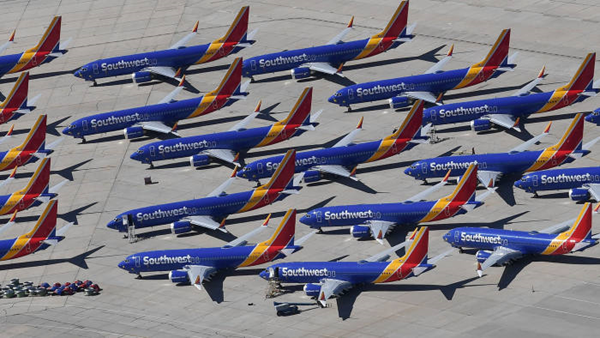|

Investors are
waiting to see how long the 737 Max will be grounded, what the
costs will be, and whether contracted sales will hold up © AFP
|
Jonathan Ford
AUGUST 4, 2019
One of the oddities of the modern US
stock market is its strong predilection for share buybacks. Rather
than finding profitable outlets for their cash holdings by investing
internally, corporations have taken to shrugging their shoulders and
simply handing the stuff back en masse.
The idea of shrinking the number of
shares outstanding has acquired its own momentum, and buybacks have
become an important driver of stock market performance. In recent
years members of the S&P 500 have increased their spending on their
own stock, last year retiring 4 per cent of the index’s capitalisation.
That is equivalent to $800bn.
Those buying back are not only mature
companies, whose need for investment might be lower. They include
growth stocks such as tech companies and those with big investment
needs including pharmaceuticals and defence. Indeed, one of the
heftier spenders of recent years has been aerospace giant
Boeing.
The company might seem an odd candidate
for a big buyback programme. Its civil aviation business involves huge
multiyear projects in which billions of dollars of capital are put at
risk. The programme for the 787 Dreamliner, for instance, lasted eight
years and cost $32bn.
Yet Boeing has found the financial space
to splurge on its own stock. Between 2013 and the end of the first
quarter of this year, it retired a net 200m shares, handing back $43bn
to holders. The number outstanding came down by 25 per cent.
One reason it could was because of
savings on the company’s latest aircraft programme, the now notorious
737 Max, grounded after two recent crashes killed 346 people. Instead
of building a wholly new aircraft, Boeing simply bolted new
fuel-efficient engines on to a tweaked existing airframe. That
significantly reduced the airframe development costs of the project,
according to company insiders. Boeing was able to redirect some of
those “savings” to repurchase stock instead.
It illustrates a choice that many chief
executives have willingly made: to prioritise buybacks over
investment. In this, they have received little but encouragement from
their financial backers. Share repurchases seem a good bet to
investors who are highly focused on short-term share price performance
compared with the uncertain (and longer-term) gains from new product
development.
Buybacks are, after all, the very purest
form of financial engineering. Unlike special dividends, they don’t
simply gear the balance sheet, they supply a further twist by reducing
the number of shares in issue. The result is to manipulate upwards the
earnings per share number — sometimes quite dramatically. In Boeing’s
case its effect was to push EPS last year up 20-25 per cent against
what it would have been without the repurchases since 2013.
Who benefits from this optical leverage?
Not necessarily the shareholders. Buybacks tend to happen when share
prices are rising anyway, exposing them to the risk of the company
destroying economic value by repurchasing overpriced equity. The
biggest winners are managers, especially those whose remuneration is
tied to stock market measures such as EPS growth. Take Boeing’s chief
executive Dennis Muilenburg. Since becoming the boss in 2015 his pay
has doubled. Last year he took home a thumping $30m in compensation
and gains from exercising options.
The problem with buyback gains is that
they are based on nothing more than making equity prices more
volatile. So while profits and share prices are rising, the lucky
executive cashes in on the favourable optics, pocketing bonuses that
won’t be subject to subsequent disgorgement.
But buybacks are a fair-weather
strategy. So if events later sour, investors not only give up all the
optical gains: volatility occurs on the downside as well, thus
magnifying the share price decline. Falling share prices can in turn
have knock-on effects, such as clobbering credit ratings.
Boeing embarked on its buyback splurge
against a backdrop of rapidly growing sales and profits due to the
sales success of the 737 Max — on course before the crashes to be one
of the best-selling airliners of all time. Now, however, the outlook
has become extremely murky. Suggestions that Boeing indulged in
shortcuts to speed the plane’s path to market may even imperil
consumer trust.
The shares have fallen by nearly a
quarter since the March crash, leading to the cancellation of a $20bn
buyback programme announced in December. Investors are waiting to see
how long the Max will be grounded, what the costs will be, and whether
contracted sales will hold up.
Boeing faces a period of magnified
instability. Investors might usefully ask themselves how much their
focus on the short run has contributed to this predicament. Perhaps it
might have been better had bosses indulged in rather less financial
engineering and rather more of the real kind.
jonathan.ford@ft.com
Copyright The Financial Times Limited 2019.

